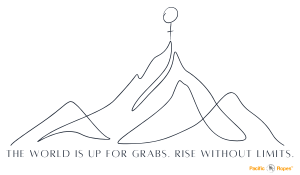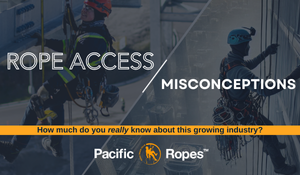Over the years, we've had the pleasure of training students from all sorts of industries, backgrounds, and experiences. The diversity of our alumni keeps us on our toes and challenges us to continually be adjusting our program and approaches to meet specific needs of each group.
We have come to realize that success in passing a rope access course, regardless of level, does not depend on previous experience or background. Successful completion of a rope access course, regardless if it's IRATA or SPRAT, depends on physical, mental, and emotional strength.
Physical Strength
Rope access training is not easy on the body. Many people begin the course and automatically lament at how hard it is. You end up using muscles that you didn't think existed and feel sore in places you never knew could get sore.
There are a lot of maneuvers to learn and practice over four days and students are expected to be active and moving 90% of the time. This may be a shock if they are more used to a sedentary workplace such as an office. But even if your employees are currently in a more active role, attending a rope access course can still be physically challenging due to the nature of the course content. Students are learning to be suspended at height on a set of two ropes. Most of the time, they aren't standing, they're suspended. In addition, they are wearing a minimum of 12 pounds of rope access gear in order perform the required movements of ascending, descending, and moving horizontally across the ropes. Levels 2 & 3 are required to perform rescues where they have to manage another person's body weight and their equipment. It's not an easy task and we try to highlight that any rope access course, regardless of level, is a very arduous experience on your body.
But, physical ability is not the only thing that affects the success of a candidate. We've seen students who are in good shape still fail because of mental and emotional reasons. We've also seen out of shape students pass because they have committed to working through their physical challenges and practice ways to accommodate their lack in fitness. For students who may not be as fit as they like, we offer solutions to help them overcome their lack of physical ability. This may include using the equipment differently, maneuvering their bodies differently, or just the option of more practice days in order to train new muscle memory. It's not uncommon sometimes when a student who is out of shape, all of a sudden find everything easy by day 4 because their muscles have gained and retained new information from the previous 3 training days.
Mental Strength
Besides physical strength, we've noticed that mental strength is required to complete a rope access course successfully.
Although we do say the course is 90% physical, theory and concepts must be understood in order to perform maneuvers safely and efficiently. The syllabus of any level is based on a proven theory of how rope access equipment should be used. We can demonstrate a maneuver and generally our students copy and repeat that maneuver in their practices. However, they must also understand why we demonstrate maneuvers in certain ways, why we use certain equipment at certain times, and why we ask them to follow certain steps.
We teach and demonstrate the syllabus in a curated environment. But when students step into their jobs the next week, they encounter specific job scenarios that require them to think through their steps before getting on rope. This is when the theory and concept teachings come into play.
During assessments and evaluations, Assessors/Evaluators may ask students to demonstrate maneuvers via concept based scenarios. This is seen more so in higher levels. They don't want to just see that a student can perform a maneuver or a rescue. They want to know if the student understands why they are doing what they are doing. They want to ensure that the candidate is able to critically think through their problems and provide solutions that are safe and in line with rope access principles.
The ability to concentrate and critically think are important.
Emotional Strength
Finally, how a student handles their emotions can impact their success in training. They can be out of shape, weak, and have a hard time understanding theory and concepts, but if they have the inner motivation to succeed, they can overcome their physical and mental challenges.
Lack of emotional strength can range from being distracted by electronic devices to not taking in constructive criticism, to not caring about being involved or passing. The latter rings the most true when the candidate hasn't financially paid for the course. There is no risk to their job security if they fail and therefore have a lower desire to work through their challenges when needed.
If a student is upgrading or re-certifying, we've also witness a downfall when they subconsciously tune out to correction of bad habits because they feel they know it all. This ends up being a disservice to them when the pressures of Assessment/Evaluation day gets to them and their bad habits cause them to make mistakes.
When employees are distracted, whether it's work or personal reasons, they tend to miss important pieces of information that can affect their performance on testing day. If a student is having problems with theory and concepts but aren't willing to study or do their homework in the evenings, they won't be able to overcome these barriers. The students we've seen who are willing to put in the extra study and practice time have always been successful. If they take advantage of all the extra resources we give them, they will succeed. But having the will to work outside of class time, to practice and study on their own time, to come back for more practice days, isn't something every student is willing to do.
Of the 3 elements, emotional strength is the most consequential, or best indicator of commitment to success. It can over come physical and mental barriers that are present in rope access training.
Summary
When it comes to deciding which employees to put through rope access training, it's best to evaluate your employees based on the three criteria above.
- Are they physically fit to do this course?
- Are the mentally fit to do this course?
- If all else fails, are they willing to give this course all they've got?
In order for us to help you with this evaluation process, we've created our Rope Access Awareness course. This course is a one day course and covers the basic maneuvers and concepts of a Level 1 Rope Access course. Normally after this one day course, a candidate can evaluate for themselves if they have the physical and mental capabilities to continue on. And if they decide not to but want to complete it anyway, then we have the extra resources we can give them to help them when they register for the full five day course.
For our Corporate Members, we give them free Rope Access Awareness course spots so that they can help their employees evaluate their suitability for rope access training, risk free! This prevents our members from paying the cost of a full course only to find out that the employee wants to quit half way through.
For more information on this visit our Corporate Member Program page.





